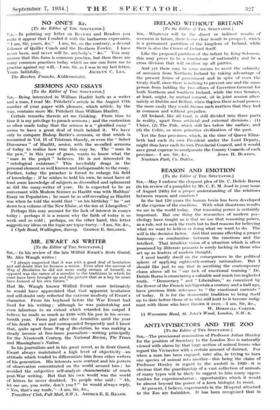MR. EWART AS WRITER
[To the Editor of THE SPECTATOR.]
SIR,—In his review of the late Wilfrid Ewart's Scots Guard, Mr. Alec Waugh writes : "I always suspected that it was with a good deal of hesitation and self-doubt that he became a writer. Even after the success of Way of Revelation he did not seem really certain of himself, so opposed was the career of a novelist to the traditions in which he must have been brought up and the picture that as a boy he must have formed of his own future."
Had Mr. Waugh known Wilfrid Ewart more intimately he would have appreciated that that apparent hesitation and self-doubt only reflected the extreme modesty of Ewart's character. From his boyhood before the War Ewart had lived for his writing ; although he was painstaking and even laborious to an extent which retarded his output I believe he made as much as 2.100 with his pen in his seven- teenth year. From just after the Armistice until the year of his death we met and corresponded frequently and I know that, quite apart from Way of Revelation, he was making a steady income at free-lance journalism—writing principally for the Nineteenth Century, the National Review, The Times and Massingham's Nation.
In his journalism and in his great novel, as in Scots Guard, Ewart always maintained a high level of objectivity—an attitude which tended to differentiate him from other writers of his generation. His interests were centred and his powers of observation concentrated on the world around him ; he avoided the subjective self-analysis characteristic of much post-War writing. But that his own world was the world
of letters he never doubted. To people who said : " Ah, let me see, you write, don't you he would always reply, "Yes, that's my trade."—! am, Sir, &c.,
Travellers' Club, Pall Mall, S.W.1. Aaruun E. E. READE.






































 Previous page
Previous page